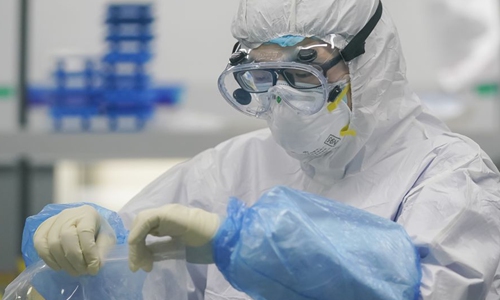Local govts ordered to test all suspected COVID-19 cases, report daily
By Wan Lin Source:Global Times Published: 2020/4/12 16:02:36

A staff member handles nucleic acid testing samples at a novel coronavirus detection lab in Wuhan, central China's Hubei Province, Feb. 22, 2020.Photo:Xinhua
Diagnostic institutes in China told the Global Times on Sunday that their current stockpiles of nucleic acid tests can meet rising demand after the country ordered provincial-level governments to conduct tests on all suspected COVID-19 cases and submit daily reports starting on Monday, a move in response to increasing imported cases and a rise in asymptomatic patients.
Di An Diagnostics, an institute that provides nucleic acid tests to medical institutes across the country, told the Global Times that it can provide 70,000 to 80,000 tests at most each day and it has not reached saturation point yet.
"Now that the country is not at the emergency stage, all kinds of testing are within the plan, so an increase in test demand will not be a problem," said Zhang Binggang, an employee at Di An Diagnostics.
In Beijing, medical institutes conduct an average of 8,600 tests each day, an official of the Beijing health commission said on a press conference on March 27.
According to a notification published on Saturday by the State Council, China's cabinet, medical institutes should carry out nucleic acid tests on all outpatients with fever as well as those who are highly suspected of being infected with the novel coronavirus. Provincial-level governments have to collect and report the previous day's test results to the State Council every day.
Suspected or confirmed COVID-19 patients should be sent to a designated hospital for further diagnosis or treatment and not be allowed to transfer or leave the hospital on their own, said the regulaiton.
Yang Zhanqiu, a virologist at Wuhan University, said that China's current testing capacity is sufficient to deal with the growing demand.
The State Council's new regulation marks China's determination to root out suspected cases within its capacity, and it also sends a signal that the anti-pandemic battle is not done, Yang noted.
The regulation was released as part of an effort to prevent a rebound of the virus after Wuhan, Central China's Hubei Province, lifted its lockdown on Wednesday and the country gradually accelerated work resumption, while still facing the pressure caused by imported infection cases and silent virus carriers.
As of Saturday, 99 new COVID-19 cases, including 97 imported ones, were reported, with 63 new asymptomatic patients confirmed, data shows.
Governments at all levels must draw up appropriate contingency plans for potential outbreaks occurring in either one place or multiple places simultaneously, taking into account possible situations with more than ten, more than 100, or an even higher number of cases. The plans should be handed in before April 20, said the notification.
The notification also said that medical institutes should improve online appointment systems for patients in order to prevent cross-infection and also invest more to boost the protection of medical workers.
Posted in: SOCIETY